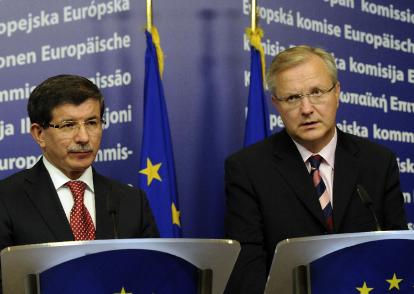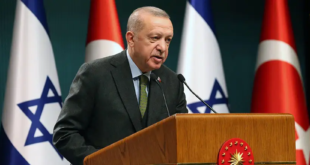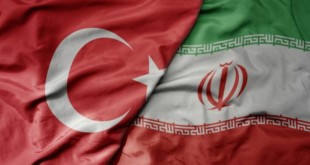 Plans to open more negotiation chapters in the EU accession negotiations are being thwarted for political reasons and Turkish leaders are fuming. Turkey’s Foreign Minister Ahmet Davutoğlu, speaking to the Daily News in Spain, says it’s not understandable. ‘We are criticized by the Europeans for not being fast enough, but is it because of us or them?’
Plans to open more negotiation chapters in the EU accession negotiations are being thwarted for political reasons and Turkish leaders are fuming. Turkey’s Foreign Minister Ahmet Davutoğlu, speaking to the Daily News in Spain, says it’s not understandable. ‘We are criticized by the Europeans for not being fast enough, but is it because of us or them?’
Some European countries reportedly intend to block the opening of the environment chapter of Turkey’s European Union-accession negotiations for political reasons, infuriating Turkish officials.
“We are faced with political blockage from some countries on the opening of the environment chapter. Trying to block the process through political reasons is unfair,” Turkish Foreign Minister Ahmet Davutoğlu said.
Davutoğlu spoke with the paper in Spain, where he held political talks with Spanish Foreign Minister Miguel Angel Moratinos. Spain will hold the next term presidency of the EU starting January.
Turkey has been planning to open the environment chapter next month at the Intergovernmental Conference, making it the 12th out of 35 chapters opened as part of negotiations over the country’s EU membership candidacy. The EU has suspended the opening of eight chapters due to Ankara’s resistance to opening its ports and airports to Greek vessels and aircrafts. France also unilaterally blocked five chapters, meaning one-third of the sections are untouchable at this time.
Now, the Greek Cypriot administration has been blocking the opening of additional chapters, including those on energy and education and culture, drawing disappointment and fury in Turkey.
“We are talking about cooperating on the energy security of Europe but we cannot open the chapter on energy because of the Greek Cypriot veto. It’s not understandable,” Davutoğlu said.
Noting that the same EU member state has also blocked the opening of the chapter on education and culture, the Turkish minister indirectly blamed EU countries for being passive on the issue. “We are criticized by the Europeans for not being fast enough,” said Davutoğlu. “But is it because of us or the EU countries’ approach?”
The minister also criticized the discouraging attitudes expressed by Europeans. “In the beginning of the negotiation process, we were told that the chapter on environment was one of the hardest to open,” he said. “But we fulfilled the opening criteria in less than a few months’ time. Instead of encouraging, they indirectly discouraged us.”
In his lengthy talks with Spanish officials, Davutoğlu repeated his complaints about this situation and asked for the removal of the blockage. “The Spanish government is optimistic on the opening of the environment chapter,” a diplomat said.
Turkey’s chief negotiator, Egemen Bağış, also discussed the issue with representatives of the current term president, Sweden, last week.
“We are also confident that this chapter will be opened, but such efforts to hinder the process through unrelated political reasons cause psychological effects,” another diplomat said. “But we should not totally be discouraged. We should continue our job with all determination.”
Davutoğlu was also received by King Juan Carlos of Spain.
Spain weighs in on Cyprus
During Sunday’s talks between Turkish and Spanish delegations, bilateral issues as well as Turkey’s EU perspective and the Cyprus issue were discussed.
According to diplomats, Spain will try to move forward with the opening of the chapter on energy during its presidency. Turkish officials also mentioned the chapters that are ready to be opened, but have been suspended due to the Greek Cypriot veto.
Moratinos, who has very close personal ties with Greek Cyprus, is thought to be able to help in overcoming the problem.
Speaking to reporters after the meeting, Moratinos described Turkey’s full membership as strategic for both parties and promised that his country’s term presidency would do its best to make the process “irreversible.”
Cyprus on Spain’s radar
The ongoing talks to reach a just and sustainable settlement in Cyprus will also be an important matter during the Spanish term presidency. As it has become obvious that it is very unlikely the parties will agree on a blueprint before the end of the year, very crucial discussions in regard to the future status of the island will be held during Spain’s term.
“We believe that the situation is appropriate for a solution. We are going to use all our creativity and experience toward a possible settlement,” Moratinos told reporters after his meeting with Davutoğlu in Cordoba.
Despite the fact that the unification talks are being held under the auspices of the United Nations, Turkey is trying to push the EU to put more pressure on the Greek Cypriots to come up with a blueprint as early as possible.
Next spring, the Turkish Cypriots will vote to elect their president, making early next year a target date for many for the deadline of the talks. The Greek Cypriots, on the other hand, are avoiding rushing to an agreement in order to first see the European Council’s decision on the fate of the negotiations with Turkey. The council will review the negotiations on the basis of its 2006 decision after Turkey refused to open its ports to Greek Cyprus.
 Eurasia Press & News
Eurasia Press & News


